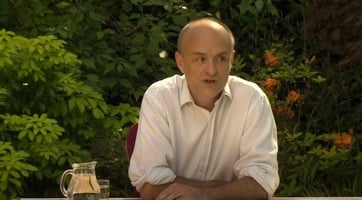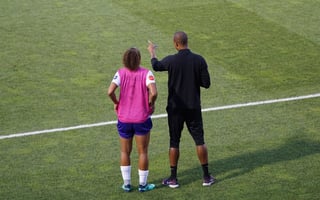Everyone seems to have had their say on Dominic Cummings and his infamous trip to Durham.
Just when you wondered if our divided nation could ever be united again, football found a way of bringing everyone together.
The plans for a so-called European Super League – supposedly designed to “save football” - pulled just about everyone together in anger.
Fans, governing bodies, politicians, players, former players, coaches and pundits quickly united to condemn the proposals.
And just 48 hours after the new midweek competition had been announced, the plans lay in tatters, with all six English clubs confirming they had withdrawn.
What can we learn from this story?
Well, for me, the best way to approach this is to focus on the club I’ve supported for longer than I can remember – Liverpool.
Like all fans of the ‘big six’, I felt embarrassed that my club was involved in the planned breakaway.
But I was also baffled by the way it handled the news.
Visible leadership
At times of huge upheaval, organisations need to show visible leadership.
Yet, when the news about Liverpool’s involvement in the new competition first emerged, the club’s owners and decision-makers were nowhere to be seen – strange when the super league was being positioned by those involved as being for the good of the game.
Even as the extent of the hostility towards the plans became clear, and the proposals became more of a crisis media management incident, the owners remained silent.
Instead, it was left to manager Jurgen Klopp and players like James Milner to answer journalist questions on the issue, during the pre- and post-match interviews they are obliged to take part in.
Interestingly, the club’s official channels opted not to include those less than favourable thoughts from their manager and player, and it normally carries every word of what its boss says in press conferences.
Silence
I’m not saying it would have changed the outcome, but one of the most striking things about the story was the way that after the plans were released, there was silence from those involved.
Where was the attempt to try and shape the narrative? Where was the attempt to show the benefits of this competition? Or to control the story?
Journalists were desperate to hear from the clubs involved, but they said nothing.
Instead, the void was filled by those queuing up to condemn the plans with nothing said to counter their opposition.
Statement
As the European Super League plans began to crumble on Tuesday night, Liverpool finally broke its silence on the issue.
It released a statement on its website that said: “Liverpool Football Club can confirm that our involvement in proposed plans to form a European Super League has been discontinued.
“In recent days, the club has received representations from various key stakeholders, both internally and externally, and we would like to thank them for their valuable contributions.”
Liverpool Football Club can confirm that our involvement in proposed plans to form a European Super League has been discontinued.
— Liverpool FC (@LFC) April 20, 2021
That was the entire statement. After two days of huge opposition, it could only find 47 words to say on the situation.
And, crucially, not one of them was ‘sorry’. With the club suffering a spectacular reputational own goal, a response at this stage of a crisis media management incident needed to include an apology, some remorse and a promise to do better in the future.
Poor statement. Some contrition from the shamed John W Henry would have been welcome. He’s let down staff, manager, players and fans. He’s badly damaged a great club’s reputation. #lfc #SuperLeague pic.twitter.com/1yzQkGWA8M
— Henry Winter (@henrywinter) April 20, 2021
Video apology
That apology did finally come yesterday morning in the shape of a video on the club’s website from owner John Henry.
I am a great fan of bosses using these videos when their organisations are in the firing line, and it is something we have seen used more often in recent crises.
And I think Mr Henry handled his mea culpa moment pretty well.
He said: “I want to apologise to all the fans and supporters of Liverpool Football Club for the disruption I caused over the past 48 hours.
“It goes without saying but should be said that the project put forward was never going to stand without the support of the fans. No-one ever thought differently in England. Over these 48 hours you were very clear that it would not stand. We heard you. I heard you.
“And I want to apologise to Jürgen, to Billy, to the players and to everyone who works so hard at LFC to make our fans proud. They have absolutely no responsibility for this disruption.”
He went on to add that he had ‘let the supporters down’.
John W Henry's message to Liverpool supporters. pic.twitter.com/pHW3RbOcKu
— Liverpool FC (@LFC) April 21, 2021
I like the personal nature of the apology, and some visible leadership from the owners was much needed.
But words matter, and the word “disruption” jars as a description of what had happened. Most Liverpool fans, I’m sure, would feel that the super league plans were more than a bit of disruption.
The timing is also an issue. Coming several hours after the club’s initial statement, Mr Henry opens himself up to questions about whether he would have apologised at all if there had not been such a backlash to what was initially said.
Whether or not you follow football, sports stories do not come much bigger than what happened this week.
What happens now? Well, all clubs involved in the super league project face a wait to see what sanctions they might face. And the fans who think it's all over will have to wait and see whether it is more than a temporary reprieve.
But the biggest challenge will be how those involved seek to rebuild their reputation with their club’s supporters and show that they have learned lessons from this crisis.
And that is going to take much more than a single video apology.
Media First are media and communications training specialists with more than 35 years of experience. We have a team of trainers, each with decades of experience working as journalists, presenters, communications coaches and media trainers.
Click here to find out more about our practical crisis communication and media training.
Subscribe here to be among the first to receive our blogs.




